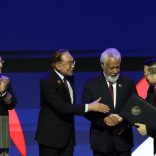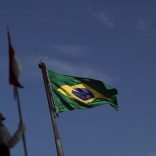Cape Verde floods kill at least eight people
People of Portuguese descent in Asia criticize CPLP “rich nation” focus

Lusa
The Portuguese-speaking citizens of ten Asian countries are to organize themselves collectively in response to what they see as the neglect of the Community of Portuguese Language Countries (CPLP) and its focus on “rich [Portuguese-speaking] nations”.
Speaking to the Lusa news agency, Joseph Sta Maria, a representative of Portuguese-speaking minorities along the Malacca coast and author of “People Prominent in the Portuguese Community in Malacca,” said the Portuguese descendants in ten Asian countries are currently organizing the first summit of the Community of Asian Portuguese.
The meeting will be held in Malacca, which has one of the largest communities of Portuguese descent in Asia, between 23rd and 29th June next year.
The new grouping will have representatives from Malaysia (Malacca), India (Goa, Daman and Diu), Sri Lanka, Singapore, China (Macau), Thailand (Bangkok), Australia (Perth), Indonesia (Jakarta, Ambon and Flores), East Timor and Myanmar.
Sta Maria, who is leading the initiative, said the block is likely to gain more members, since he believes there are still many people of Portuguese descent in Asia yet to be identified, adding that the summit would invite the Portuguese Prime Minister António Costa, because he too is a Luso-Asian “mestizo” with Goan ancestry.
Sta Maria justified his “rebel” action by alleging that the CPLP “is [only] interested in rich nations” such as Equatorial Guinea, where the official language is Spanish.
“I do not know if they [the CPLP] even know we exist” he said.
The Luso-descendent acknowledged that the Eurasians concerned are minorities without political power and, as such, cannot be included as members of the CPLP, but said that the existence of communities like his that “keep Portuguese culture alive for five centuries, communicating in Portuguese [Malay-Portuguese Creole],” is “priceless”.
He also cited the black Portuguese Tugu, who “were taken as slaves to Batavia [Jakarta], forced to convert to Protestantism and to change their names to Dutch names” but who were nevertheless “still proud to be called Portuguese”.
“Does Portugal not feel proud of that?” he asks, saying the country “has a moral responsibility” to its “children” around the world. While recognizing that Portugal itself faces difficulties, the author pointed out that the “CPLP has rich member nations” such as Brazil.
Asked about concrete assistance, Sta Maria floated the idea of building a model Portuguese settlement of “80-100 hectares” to disseminate the Portuguese culture and Catholicism. It would attract tourists from around the world and could be “a very lucrative business for the CPLP and wealthiest organizations in the world like the [Calouste] Gulbenkian and East foundations,” he said.
The Portuguese were responsible for many of the first European contacts with the East and came to manage many territories in the region, including Malacca, East Timor and Macau.












Leave a Reply
Be the First to Comment!
You must be logged in to post a comment.
You must be logged in to post a comment.